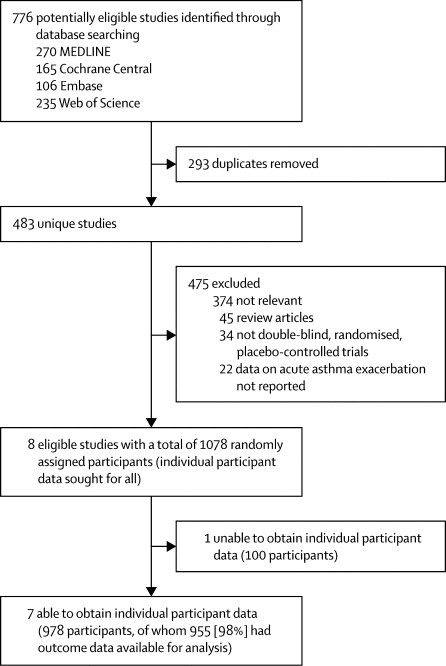The Lancet Respiratory Medicine ( IF 38.7 ) Pub Date : 2017-10-03 , DOI: 10.1016/s2213-2600(17)30306-5 David A Jolliffe , Lauren Greenberg , Richard L Hooper , Christopher J Griffiths , Carlos A Camargo , Conor P Kerley , Megan E Jensen , David Mauger , Iwona Stelmach , Mitsuyoshi Urashima , Adrian R Martineau

|
Background
A previous aggregate data meta-analysis of randomised controlled trials showed that vitamin D supplementation reduces the rate of asthma exacerbations requiring treatment with systemic corticosteroids. Whether this effect is restricted to patients with low baseline vitamin D status is unknown.
Methods
For this systematic review and one-step and two-step meta-analysis of individual participant data, we searched MEDLINE, Embase, the Cochrane Central Register of Controlled Trials, and Web of Science for double-blind, placebo-controlled, randomised controlled trials of vitamin D3 or vitamin D2 supplementation in people with asthma that reported incidence of asthma exacerbation, published between database inception and Oct 26, 2016. We analysed individual participant data requested from the principal investigator for each eligible trial, adjusting for age and sex, and clustering by study. The primary outcome was the incidence of asthma exacerbation requiring treatment with systemic corticosteroids. Mixed-effects regression models were used to obtain the pooled intervention effect with a 95% CI. Subgroup analyses were done to determine whether effects of vitamin D on risk of asthma exacerbation varied according to baseline 25-hydroxyvitamin D (25[OH]D) concentration, age, ethnic or racial origin, body-mass index, vitamin D dosing regimen, use of inhaled corticosteroids, or end-study 25(OH)D levels; post-hoc subgroup analyses were done according to sex and study duration. This study was registered with PROSPERO, number CRD42014013953.
Findings
Our search identified 483 unique studies, eight of which were eligible randomised controlled trials (total 1078 participants). We sought individual participant data for each and obtained it for seven studies (955 participants). Vitamin D supplementation reduced the rate of asthma exacerbation requiring treatment with systemic corticosteroids among all participants (adjusted incidence rate ratio [aIRR] 0·74, 95% CI 0·56–0·97; p=0·03; 955 participants in seven studies; high-quality evidence). There were no significant differences between vitamin D and placebo in the proportion of participants with at least one exacerbation or time to first exacerbation. Subgroup analyses of the rate of asthma exacerbations treated with systemic corticosteroids revealed that protective effects were seen in participants with baseline 25(OH)D of less than 25 nmol/L (aIRR 0·33, 0·11–0·98; p=0·046; 92 participants in three studies; moderate-quality evidence) but not in participants with higher baseline 25(OH)D levels (aIRR 0·77, 0·58–1·03; p=0·08; 764 participants in six studies; moderate-quality evidence; pinteraction=0·25). p values for interaction for all other subgroup analyses were also higher than 0·05; therefore, we did not show that the effects of this intervention are stronger in any one subgroup than in another. Six studies were assessed as being at low risk of bias, and one was assessed as being at unclear risk of bias. The two-step meta-analysis did not reveal evidence of heterogeneity of effect (I2=0·0, p=0·56).
Interpretation
Vitamin D supplementation reduced the rate of asthma exacerbations requiring treatment with systemic corticosteroids overall. We did not find definitive evidence that effects of this intervention differed across subgroups of patients.
Funding
Health Technology Assessment Program, National Institute for Health Research (reference number 13/03/25).
中文翻译:

补充维生素D预防哮喘加重:个体参与者数据的系统评价和荟萃分析
背景
先前对随机对照试验进行的汇总数据荟萃分析表明,补充维生素D可降低需要全身性糖皮质激素治疗的哮喘加重率。这种作用是否仅限于基线维生素D水平低的患者尚不清楚。
方法
为了进行系统的回顾以及对单个参与者数据的一步和两步荟萃分析,我们在MEDLINE,Embase,Cochrane对照试验中央注册簿和Web of Science中进行了双盲,安慰剂对照,随机对照试验的搜索维生素D 3或维生素D 2在数据库开始至2016年10月26日之间发布了报告哮喘加重发生率的哮喘患者补充药物。我们分析了每项符合条件的试验的主要研究者要求的个体参与者数据,调整了年龄和性别,并按研究进行了聚类。主要结局是需要全身应用皮质类固醇激素治疗的哮喘加重发生率。混合效果回归模型用于获得95%CI的综合干预效果。进行了亚组分析,以确定维生素D对哮喘急性发作风险的影响是否根据基线25-羟基维生素D(25 [OH] D)浓度,年龄,种族或种族起源,身体质量指数,维生素D给药方案,吸入皮质类固醇的使用或最终研究25(OH)D水平;根据性别和研究持续时间对事后进行亚组分析。该研究已在PROSPERO注册,编号为CRD42014013953。
发现
我们的搜索确定了483项独特的研究,其中八项是合格的随机对照试验(总共1078名参与者)。我们为每个参与者寻求参与者数据,并获得了七个研究(955个参与者)的数据。在所有参与者中,补充维生素D降低了需要全身性糖皮质激素治疗的哮喘加重率(校正后发生率[aIRR] 0·74,95%CI 0·56-0·97; p = 0·03; 955名参与者中有七个研究;高质量的证据)。至少一次加重或首次加重时间的参与者中,维生素D和安慰剂之间无显着差异。互动= 0·25)。所有其他亚组分析的相互作用p值也均高于0·05;因此,我们没有表明该干预措施在任何一个亚组中的效果都强于另一个亚组。有6项研究被评估为偏倚风险低,而一项研究被评估为存在偏倚风险不清楚。两步荟萃分析未发现效应异质性的证据(I 2 = 0·0,p = 0·56)。
解释
补充维生素D降低了需要全身应用全身糖皮质激素治疗的哮喘急性发作率。我们没有找到明确的证据表明这种干预的效果在患者亚组之间有所不同。
资金
美国国立卫生研究院卫生技术评估计划(参考号13/03/25)。











































 京公网安备 11010802027423号
京公网安备 11010802027423号